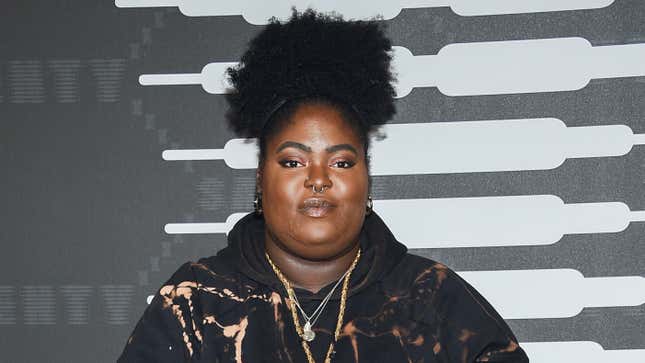
For many men and women, loving your body is no small challenge. But if you’re fat and have the audacity to love and be confident in your body, even the compliments are barbed.
Rapper Chika highlighted this dynamic on Tuesday night, responding to a well-intentioned Instagram commenter who asked her how she “[stays] positive about her weight,” adding that they were only asking because they were “seriously struggling with it” themselves.
“This is a rude question,” Chika responded. “I know you meant well but I’m tired of talking about my body with strangers.”
The 23-year-old Nigerian-American artist continued, “how can I stay positive about my body when I’m being asked about being fat every 10 minutes.”
It’s the kind of comment that, while appearing on its face to be complimentary, is only ever lodged at women in the public eye. Chika expanded on her response on her Instagram stories, which she posted to her timeline Wednesday morning.
“For me it’s a double-edged sword because this topic is like—it’s something I hate talking about, but if I don’t talk about it, people will keep doing it, so I’m put in a very uncomfortable position,” she said, adding that this was the last time she will address the issue.
“Stop fucking asking me about my body. In fact, stop asking everyone about their bodies,” Chika continued, adding, “I don’t give a fuck if you look like me, you don’t look like me, if you’re looking for some kind of confidence boost, if you’re looking for some kind of advice. Bitch, I am not a therapist. I am not somebody who’s designated to let you know how to love yourself.
“Do not come in my comments asking me how the fuck I would dare love myself,” she said. “Like, I don’t give a fuck what place you’re coming from, it’s fucking rude. Who raised y’all?”
The artist, who also models and acts, says she feels gaslit into not speaking up about the barrage of comments about her body because it’s coming from well-intentioned fans who are “genuinely struggling with their own shit.
“But at the same time, intention versus impact,” she said, adding that the accumulation of interest in her body was “damaging” and pointing out that, no matter if she lost, gained or maintained her weight, she had nothing to gain from the attention.
“I am not the spokesperson for body positivity. I’m not the spokesperson for being dark-skinned. I’m not the spokesperson for having a nappy-ass dread head. I am none of those things. Stop asking me questions that you should figure out for yourself,” she said.
It’s not the first time the “Industry Games” rapper has called out toxic comments related to her body, but discussing ostensibly positive remarks from fans is a harder needle to thread than calling out more blatant examples of misogynoir and fat-phobia. While the “body positivity” movement has created more space for fat women in fashion and music to be visible—which is to say, to simply share the same platforms and get similar opportunities as smaller, more “conventionally attractive” women—they are still tasked with constantly having to explain themselves and their relationships to their bodies to the public.
While some might be happy to take on this mantle, it’s presumptuous to assume any woman wants or needs to talk at length about something as personal and complicated as their relationship to their body—or that they’re qualified to dispense advice. Even complimenting fat women on their “confidence” or “bravery” emphasizes the idea that such feelings are anomalous or strange: that being fat betrays a norm, and fat women ought to feel shame and insecurity over it. On top of being a loaded assumption, it’s a ludicrous one—especially considering many skinny women in the entertainment industry have spoken at length about their struggles embracing their appearance.
As Chika alluded to, the deluge of commentary about her body is also distracting, reducing the talented and outspoken artist time and again to a handful of her physical traits: her weight, her skin, her hair. So while Chika’s strongly worded response may seem abrasive to some, it’s nevertheless a helpful reminder that greater proximity to celebrities via Instagram doesn’t allow you to forget your home training. Fans, after all, still have the option of calling an artist “beautiful” and “inspiring.” But the backhanded interrogations praising marginalized women for daring to be themselves can go.

